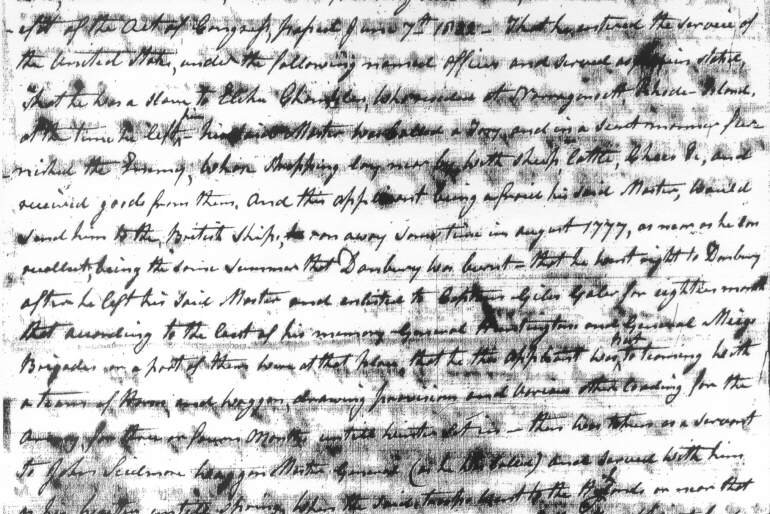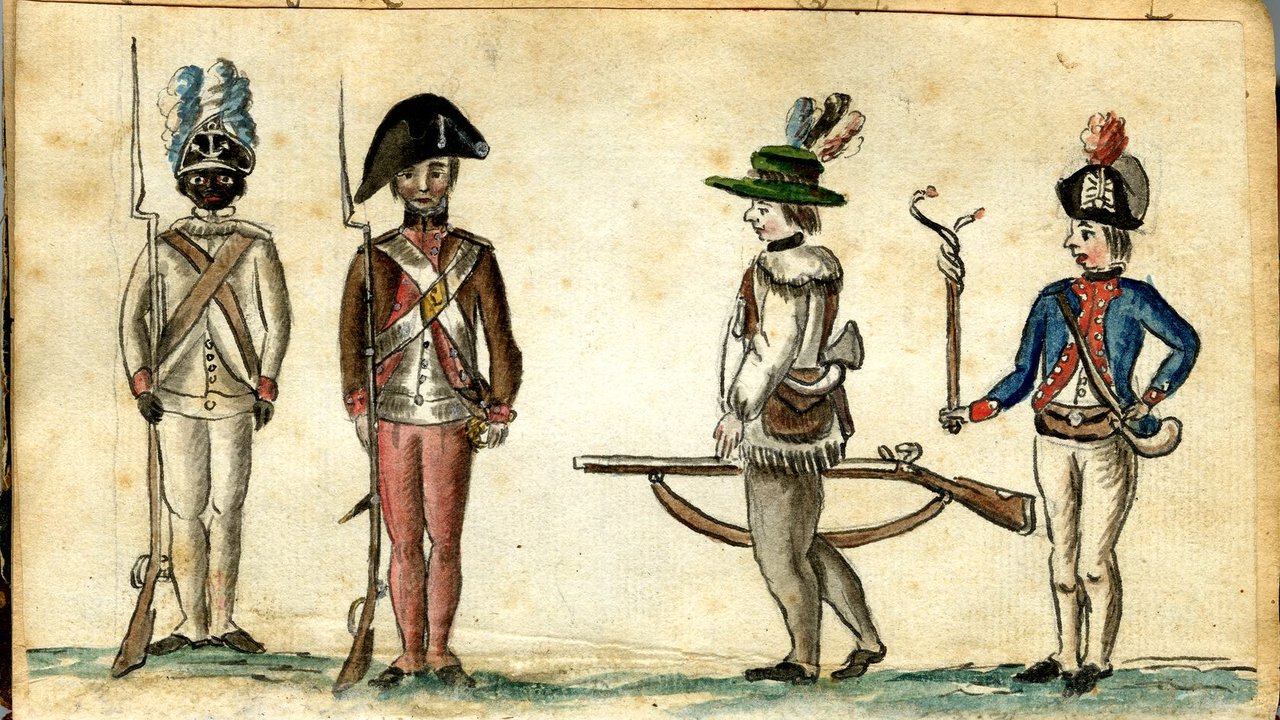
The Pension Application of Jehu Grant
At about 25 years old, Jehu Grant made the decision to self-emancipate and join the Continental Army. Born in Rhode Island, Grant was the property of Elihu Champlen, a supposed loyalist in Narragansett. In 1777, Grant ran to the Continental Army and began working in various roles as a laborer. For eight months, he mostly worked as a waggoner and servant to John Skidmore, who was the wagon master. A relatively short length of freedom came to an end when Champlen finally found him and informed the army of Grant’s fugitive status. Grant was immediately turned over to Champlen, cutting his length of service short, and assisting in his re-enslavement.1
Grant was eventually able to purchase his freedom, with the assistance of Joshua Swan. The exact nature of their relationship is unknown, but Grant essentially agreed to indenture himself to Swan in exchange for assistance in procuring his freedom. Swan moved to Saratoga County, New York, shortly after this agreement was made, where Grant finished out his term. Grant stayed in Saratoga County afterwards, forming a family and likely enmeshing himself further into the local community.2
In 1832, at the age of 80, Grant found out Congress had recently passed a new Pension Act, which vastly extended the number of people who were eligible for a Revolutionary War pension. With the assistance of neighbor, Grant, who was blind at this point, made his way to the local courthouse to apply for a pension in September. The next month, Grant received a denial, stating his job as a teamster and waiter did not make him a soldier, and he was thus outside the bounds of the Pension Act.3
Grant may have decided to appeal this decision. While the documents aren’t known to have survived, a later document references a 1734 letter Grant received informing him that his status as a fugitive slave excluded him from being pension eligible. The reference to this 1734 letter comes from a letter Grant sent to the Commissioner of Pensions, sent at the end of 1736, along with many depositions from neighbors about his character and history. In the letter, Grant once again speaks to how his enslaver was a loyalist, his fear of being forced to serve the British, and how he found hope in seeing “liberty poles & the people all engaged for the support of freedom.”4
A pension was never issued to Grant, and he died in 1840. His story illustrates how enslaved people made choices about who to support during the war, how those choices were influenced by a desire to be free, and their experiences attempting to secure that freedom. While taking place in the Antebellum period, his attempt to receive a pension is an important part of the story of Black Americans and the American Revolution. As he sought to claim a part of the Revolutionary legacy and compensation for his role in securing American freedom, Grant staked out a place in defining the aims and end results of the American Revolution.
Declaration by Jehu Grant, September 11, 1832
…Vice Chancellor. On this 11th day of September 1832, personally appeared in open Court before the said Chancellor, Jehu Grant, of Milton in the County of Saratoga and State of New York, aged, according to the best information he possesses about seventy-seven years, Who being first duly sworn according to Law, doth on his oath, make the following declaration, in order to obtain the benefit of the Act of Congress, passed June 7th 1832. That he entered the Service of the United States, under the following named officers and served as herein stated, That he was a slave to Elihu Champlen, Who resided at Narragansett, Rhode-Island, at the time he left him. his said Master was Called a Tory, and in a secret manner furnished the Enemy, Whose shipping lay near by, with sheep, cattle, chees &c, and received goods from them, And this applicant being afraid his said Master, would send him to the British ships, ran away some time in August 1777, as near as he can recollect, being the same summer that Danbury was burnt. that he went right to Danbury after he left his said Master and enlisted to Captain Giles Gates for eighteen month that according to the best of his memory General Huntington and General Meig's Brigades or a part of them were at that place, that he this Applicant was put to teaming with a team of Horses, and Waggon, drawing provision and various other loading for the Army, for three or four Months untill winter set in. then was taken as a servant to John Scidmore Waggon Master General (as he was called) and served with him as his Waiter untill spring, When the said troops went to the Hyghlands or near that place on the Hudson River, a little above the British lines. that this Applicant had Charge of the Teams as Waggoner and Carryed the said General Scidmores Bagage and Continued with him (and the said troops) as his Waggoner near the said lines untill some time in June, When his said Master either Sent or Came and this applicant was given up to his Master again, and he returned, after having served nine or ten month…
______________________________
Letter to Commissioner of Pensions, December 1, 1836
Hon. J. L. Edward Commiss. of Pensions
Your servant begs leave to state that he forwarded to the War Department a declaration founded on the pension Act of June 1832 praying to be allowed a pension (If his memory serves him) for ten Months service in the American Army of the revolutionary war -- that he enlisted as a soldier but was put to the service of a teamster in the summer & a waiter in the winter. In April 1834 I received a writing from your Hon[or], informing me that my "Services while a fugative from my Master's Service Was not imbraced in said Act." And that my "papers were placed on file." In my said declaration I just mentioned the Cause of leaving my Master as may be seen by a referance thereunto, And I now pray that I may be permitted to express my feelings more fully on that part of my said declaration. I was then grown to Manhood in the full Vigour and Strength of life and heard much about the Cruel and arbitary things done by the British, Their ships lay within a few miles of my Master's house which stood near the shore and I was confident that my Master traded with them, and I suffered much from fear that I should be sent aboard a ship of war, this I disliked But when I saw liberty poles & the people all engaged for the support of freedom, I could not but like & be pleased with such thing. (God forgive me if I sinned in so feeling) And living on the borders of Rhode Is. where whole companies of coloured people enlisted, it added to my fears and dread of being sold to the British These considerations induced me to enlist into the American Army where I served faithfull about 10 months. When my Master found and took me home, had I been taught to read or understand the precepts of the Gospel, "Servants obey your Masters" I might have done otherwise notwithstanding the songs of liberty that saluted my ear, thrilled through my heart. But feeling conscious that I have since compensated my Master for the Injury he sustained by my enlisting and that God has forgiven me for so doing and that I served my country faithfully and that they having enjoyed the benefits of my Service to an equal degree for the length time I served with those generally who are receiving the liberalities of the Government I cannot but feel it becoming me to pray Your Hon[or], to review my declaration on file and the papers herewith annexed. A few years after the war Joshua Swan Esqr of Stoningtown purchased me of my Master and agreed that after I had served him a length of time named faithfully I should be free, I served to his satisfaction & so obtained my freedom. He moved into the Town of Milton where I now reside about 48 years ago. After my time expired with Esqr Swan I Married a wife We have raised six children 5 are still living I must be upwards of 80 years of age and have been blind for many years and Notwithstanding the aid I receive from the honest Industry of my children We are still very needy and in part are supported from the benevolence of our friends, With these statements and the Testimony of my character herewith presented I humbly rest my claim upon the Well known liberality of Government…
Black Americans and the American Revolution
By the time of the American Revolution, there was a sizable Black population in the colonies. Black Americans were involved in several ways, and witnessing the revolution around them was just one such way.
As witnesses to a unique time in history, Black Americans offered their own opinions and observations of the events around them. For some, this proved crucial in finding and fighting for freedom. For others, this meant they could contribute their own opinions to the chorus of revolutionary-era rhetoric.

Sources
- “Declaration, 11 September 1832 (with supporting deposition by Adam Swan),” https://www.saratoganygenweb.com/JehuGrant.htm
- “Declaration, 11 September 1832 (with supporting deposition by Adam Swan),” https://www.saratoganygenweb.com/JehuGrant.htm
- “Letter from War Department in Denial of Claim,” https://www.saratoganygenweb.com/JehuGrant.htm
- “Letter to Commissioner of Pensions, 1 December 1836,” https://www.saratoganygenweb.com/JehuGrant.htm
